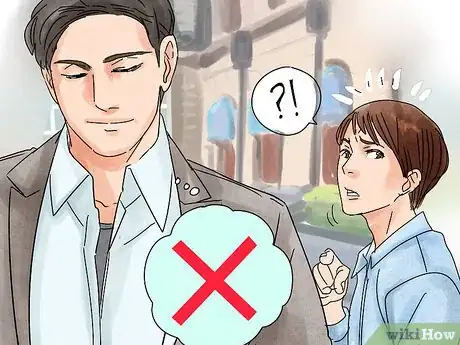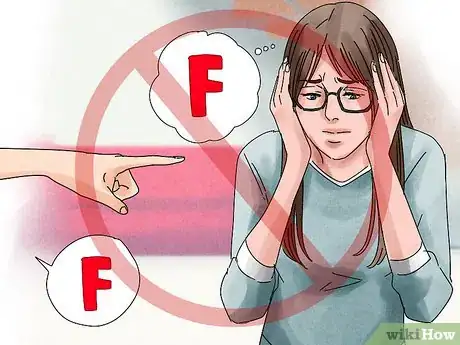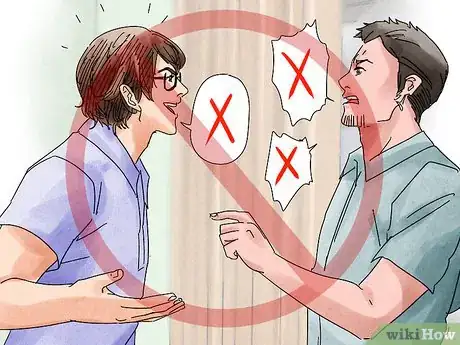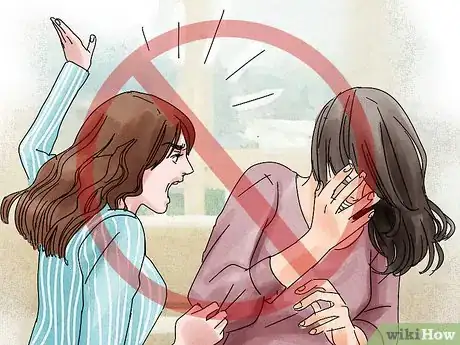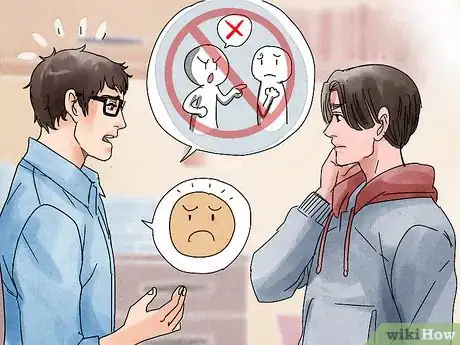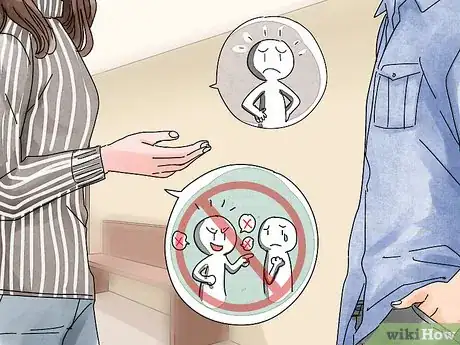This article was co-authored by wikiHow Staff. Our trained team of editors and researchers validate articles for accuracy and comprehensiveness. wikiHow's Content Management Team carefully monitors the work from our editorial staff to ensure that each article is backed by trusted research and meets our high quality standards.
There are 7 references cited in this article, which can be found at the bottom of the page.
This article has been viewed 58,540 times.
Learn more...
It is difficult to not care what other people say about us. In reality, most of us have a natural tendency to care what others think. When people say mean things to us, or about us, it is important to not let those negative individuals bring us down. While it isn’t always easy to brush off hurtful words, developing positive habits, limiting negative reactions, and building self-confidence are all habits that can help you avoid caring about what other people say.
Steps
Developing Positive Habits
-
1Walk away from people who say bad things about you. The best way to react to someone who is saying mean things about you is to not react. By ignoring those people and the things they are saying, you are showing them that you aren’t bothered by them. [1] People who say mean things often enjoy getting a negative reaction out of others. Practice ignoring them by walking away.
- Walking away and ignoring mean people extends beyond in-person interactions. If people are being mean to you through social media or text messages, for instance, block or unfriend them.
- If you see a negative comment written about you, stop reading it. While it is certainly hurtful to know someone has written something mean about you, that doesn’t mean you have to read it.[2]
- Take a break from social media and texting, from time to time.
-
2Focus on your true friends. Unfortunately, there will probably always be someone who doesn’t like you. That is true for everyone. Rather than worrying about that one person, spend more time with the people who care about you and like you as you are. [3]
- Your true friends know that the hurtful things someone else might be saying about you are not true. Real friends will stand by your side and help you ignore or brush off the mean comments.[4]
Advertisement -
3Recognize that mean comments are a negative reflection on the person making them, not on you. When someone says negative things about you, they are really revealing a lot about themselves. [5] Feeling that they need to be negative about others shows that they are unkind, and possibly feel insecure about themselves.
- People who are happy with themselves and their lives do not waste time tearing others down.
- Mean people sometimes make negative comments about other people as a way of distracting others from noticing their own flaws and the things they feel insecure about.
-
4Remind yourself of your positive qualities. Sometimes the negative things other people say about us can replay in our heads over and over. Push those negative thoughts aside and regularly remind yourself of all the good things about you.
- As you “talk yourself up” and focus on the good every day, those positive thoughts will become part of how you see yourself and your confidence should grow.[6]
- Avoid depending on feeling validated by others and whether or not they like you. Accepting yourself and recognizing your positive attributes is more valuable.
-
5Make a list of what is important to you. Write down the things you value most in life, as well as the type of person you want to be. Doing so will help you become more sure of yourself and what you stand for. When you are clear about what is important to you, you’ll notice you begin caring less about what others say about you.[7]
- Writing down what is important to you is also a great way to keep those things fresh in your mind so that you think and act in ways that match your values. Part of that should include not caring about what others say.[8]
- Revisit your list when you are questioning yourself over someone's opinion. Try asking yourself, "Do I agree with what this person thinks/says about me?"
-
6Take control of your life and do things you enjoy. There is no way that you can control what other people do, say, or think. Instead of worrying about what others think of you, go out and do things you enjoy. Participating in activities you like gives you something fun and positive to focus on.[9] Before you know it, you’ll be enjoying your own life and won’t have time to care about what other people say or think.
Limiting Negative Reactions
-
1Don’t take negative comments personally. Remember, you are not the negative comments someone makes about you and you don’t need that person’s validation. That person has their own reasons for being mean and those reasons have nothing to do with you.[10]
- Try telling yourself something like, "Her comment is only one of many. I can't make everyone happy, but I can make myself happy."
-
2Stop blaming yourself when someone is making negative comments. It is not your fault that some people have a tendency to be negative. Let them be unhappy if they wish. Just realize that you are not to blame for their negative attitude.
- To avoid blaming yourself for the comments someone makes about you, try saying something to yourself like, "I wonder if she has had a hard day? It seems she is taking it out on me. I hope she feels better tomorrow." Or, "I know her comment has more to do with her than with me. I'll focus on what is more important, which is what I think - not her."
-
3Avoid getting back at others by making mean comments about them. When someone says something mean about you, it can be tempting to say something equally mean in return. Doing so makes you just as bad as that person, though. Practice being the type of person you want to be and don’t stoop to the level of those who are negative. [11]
-
4Avoid responding with physical violence. When someone is constantly pushing your buttons by making rude and hateful comments to you, there might be times when you feel like turning around and punching them. You know that fighting is never the solution, though. Using physical violence to deal with someone who acts like a bully will probably lead to more violence. [12] Choose to walk away.
-
5Don’t be afraid to speak up and talk about what is making you feel bad. No matter how much you work on developing positive habits and limiting negative reactions to mean people, there might still be times when their words get to you. When you feel that way, find someone to talk to about it.[13]
- Friends or family members can remind you of everything they like about you and help you brush off those negative comments.
- If you are still in school, speaking to a trusted teacher or guidance counselor can help you deal with the negative comments and realize that none of those things are true.
-
6Stand up for yourself through assertive communication. When someone says something mean about you, it’s normal to want to either say something mean in return or to hide from that person. However, both options lead to a negative outcome. By saying something mean back, you are acting just like the other person. By hiding, you are avoiding the situation and will likely continue to feel bad about it.
- You can be assertive and stand up for yourself in a positive and respectful manner.
- When someone says something mean to you, try saying something like, “I don’t appreciate the mean things you said about me. They aren’t true and I won’t listen if you say things like that.”
- It’s okay to let some time pass before speaking up so that you no longer feel so emotional about the situation.[14] For example, if someone at school or work says something rude to you, give yourself a day or two to get past the hurt feelings before letting them know how that made you feel.
Building Self-Confidence
-
1Create a list of your strengths. Writing down your personal strengths is a great way to remind yourself of everything you have to offer the world. [15] List at least three things you are good at, but don’t stop there. Write down as many strengths as you can think of. Don’t be afraid to ask your friends and family what strengths they think you have and write those down too.
- Keep your list of strengths in a safe place. Whenever you are struggling to feel confident in yourself, read through the list and remember all the things you are good at.
- Examples of strengths you might write down can include being a good listener, caring for others, having strong ethics, being a hard worker, or excelling in a particular area, such as music or athletics.
-
2Say something positive about yourself every day. You deserve to feel good about who you are. Give yourself a confidence boost by complimenting yourself just as you would someone else.[16] When you recognize something positive about yourself every day, you’ll start developing a habit of feeling good about yourself. As your confidence goes up, it gets easier to avoid caring about what others think or say.
-
3Accept compliments with thanks and grace. When others say something nice about you, let them know you appreciate their kind words and say “thank you.” Don’t brush off a genuine compliment because you think you’re undeserving.[17] By gracefully accepting compliments, you are showing the other person your appreciation. You should also discover your confidence increasing with time.
-
4Compliment others regularly. Just as receiving a compliment can boost your confidence, giving compliments can too. Letting someone know you like their outfit or that they did a great job on something is a great way to maintain a positive attitude, which can help you feel more confident overall.
-
5Maintain a positive outlook on life. When you look at the bright side of things, it’s easier to maintain a positive attitude. That positive outlook is important to feeling more confident, as well as not caring what others think about you.[18]
- To stay positive, avoid dwelling on negative situations or experiences and minimize complaining.
Warnings
- Don't let anger get the best of you by saying negative things to get back at those who are being mean to you.⧼thumbs_response⧽
- Avoid getting into physical altercations with people who are saying bad things about you.⧼thumbs_response⧽
References
- ↑ http://kidshealth.org/en/teens/bullies.html#
- ↑ http://www.niashanks.com/guide-not-care-what-people-think/
- ↑ http://www.niashanks.com/guide-not-care-what-people-think/
- ↑ http://kidshealth.org/en/teens/bullies.html#
- ↑ http://www.niashanks.com/guide-not-care-what-people-think/
- ↑ http://www.fastcompany.com/3040980/how-to-stop-caring-about-what-others-think
- ↑ http://lifehacker.com/how-to-stop-giving-a-f-ck-what-people-think-1530784365
- ↑ http://www.fastcompany.com/3040980/how-to-stop-caring-about-what-others-think
- ↑ http://kidshealth.org/en/teens/bullies.html#
- ↑ http://www.fastcompany.com/3040980/how-to-stop-caring-about-what-others-think
- ↑ http://www.fastcompany.com/3040980/how-to-stop-caring-about-what-others-think
- ↑ http://kidshealth.org/en/teens/bullies.html#
- ↑ http://kidshealth.org/en/teens/bullies.html#
- ↑ http://www.everydayhealth.com/emotional-health/standing-up-for-yourself.aspx
- ↑ https://www.psychologytoday.com/blog/hide-and-seek/201205/building-confidence-and-self-esteem
- ↑ https://www.psychologytoday.com/blog/hide-and-seek/201205/building-confidence-and-self-esteem
- ↑ http://www.skillsyouneed.com/ps/confidence.html
- ↑ http://www.skillsyouneed.com/ps/confidence.html
